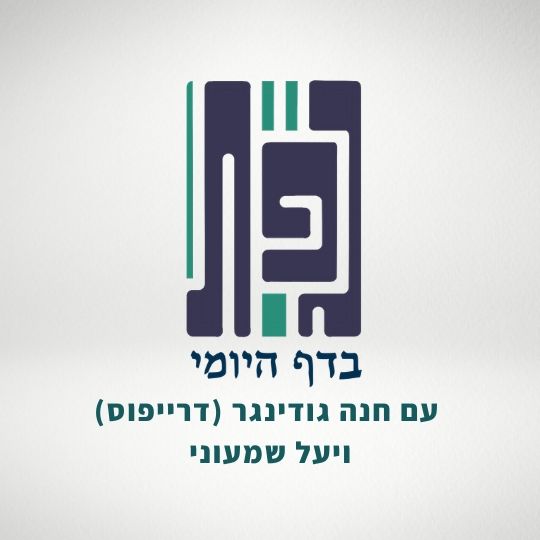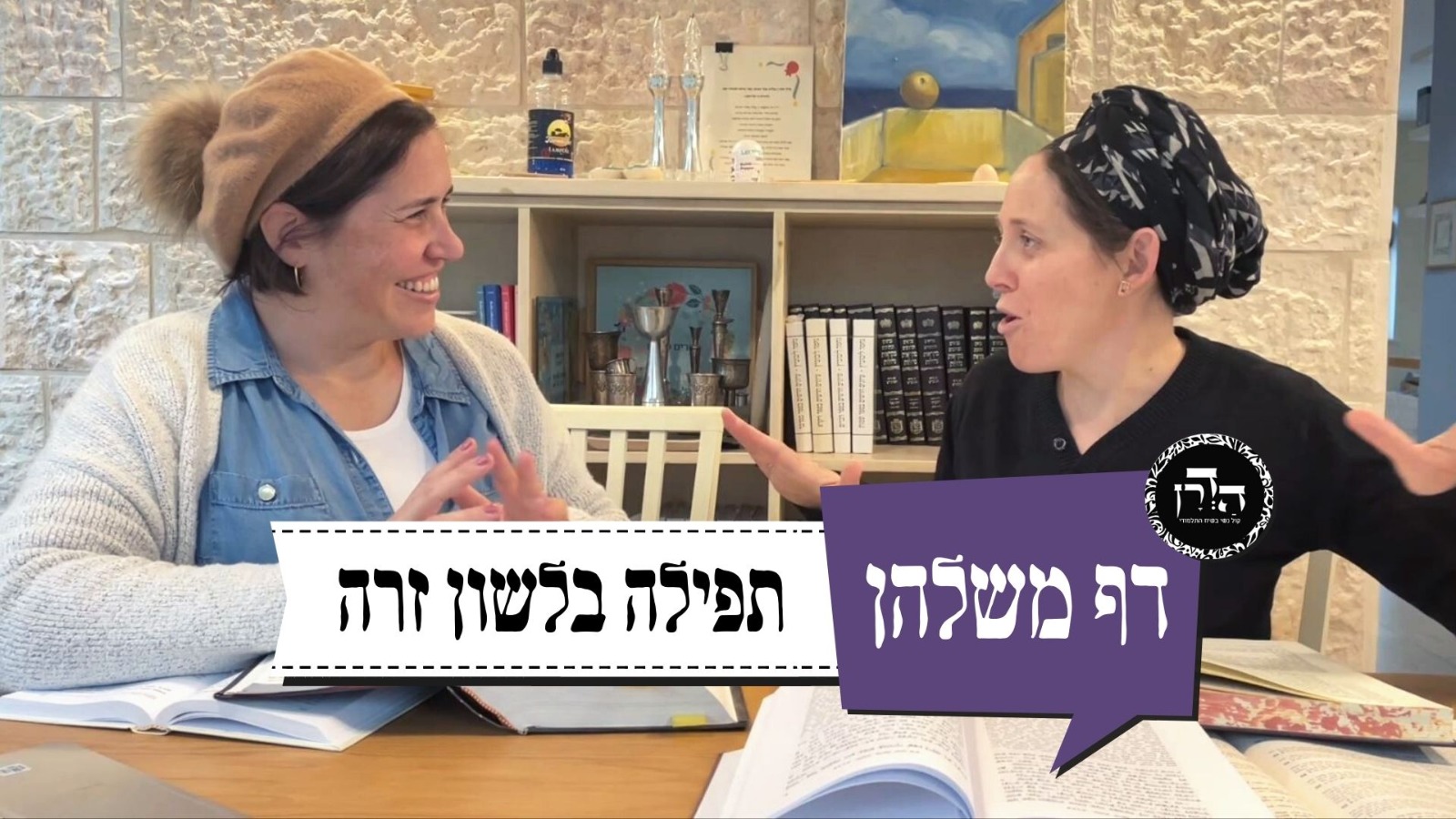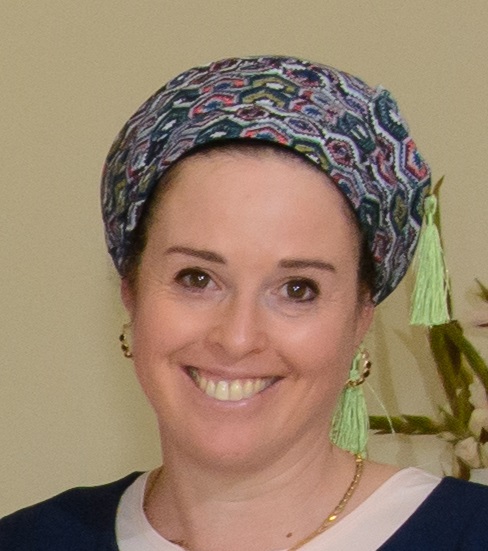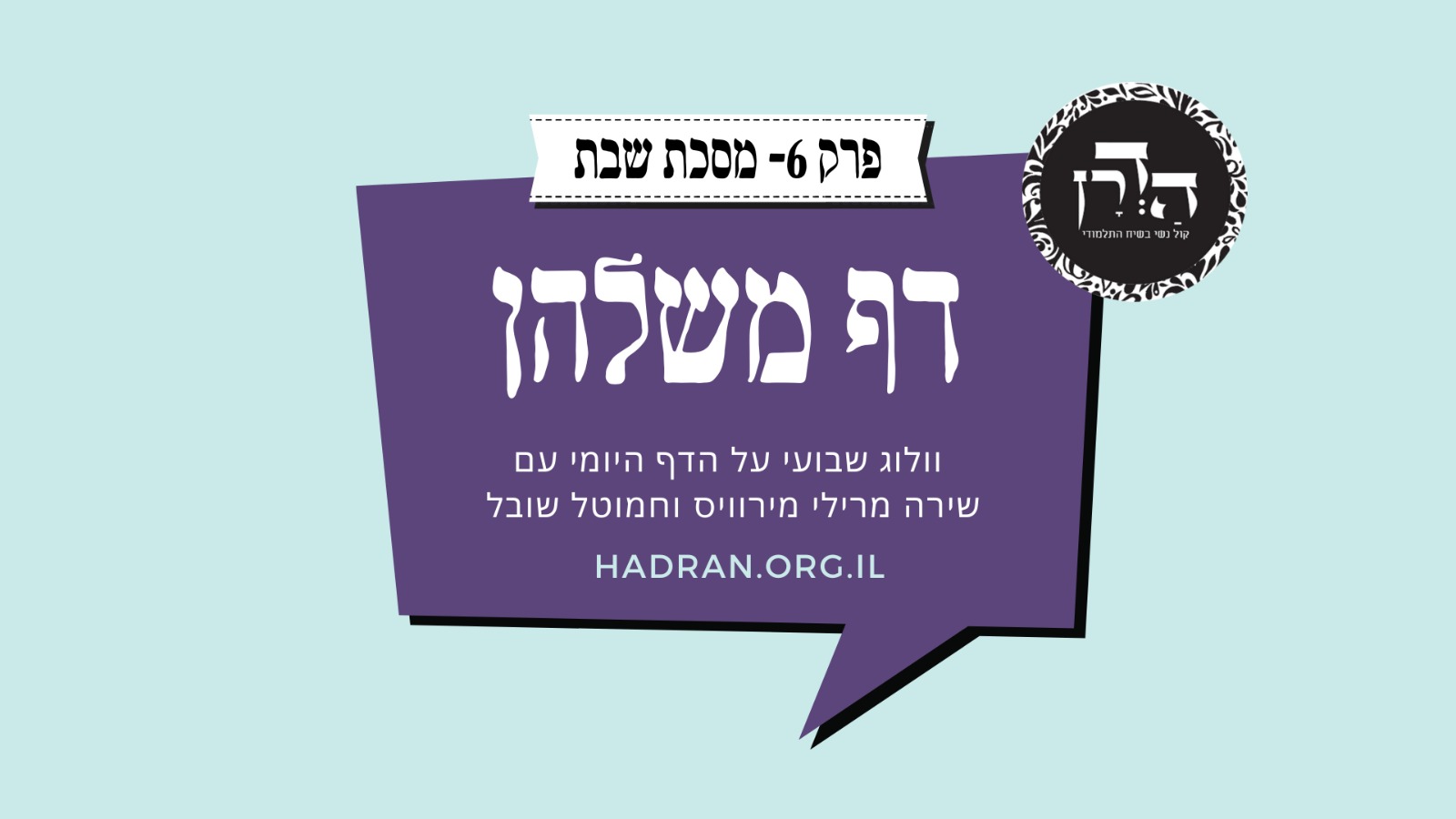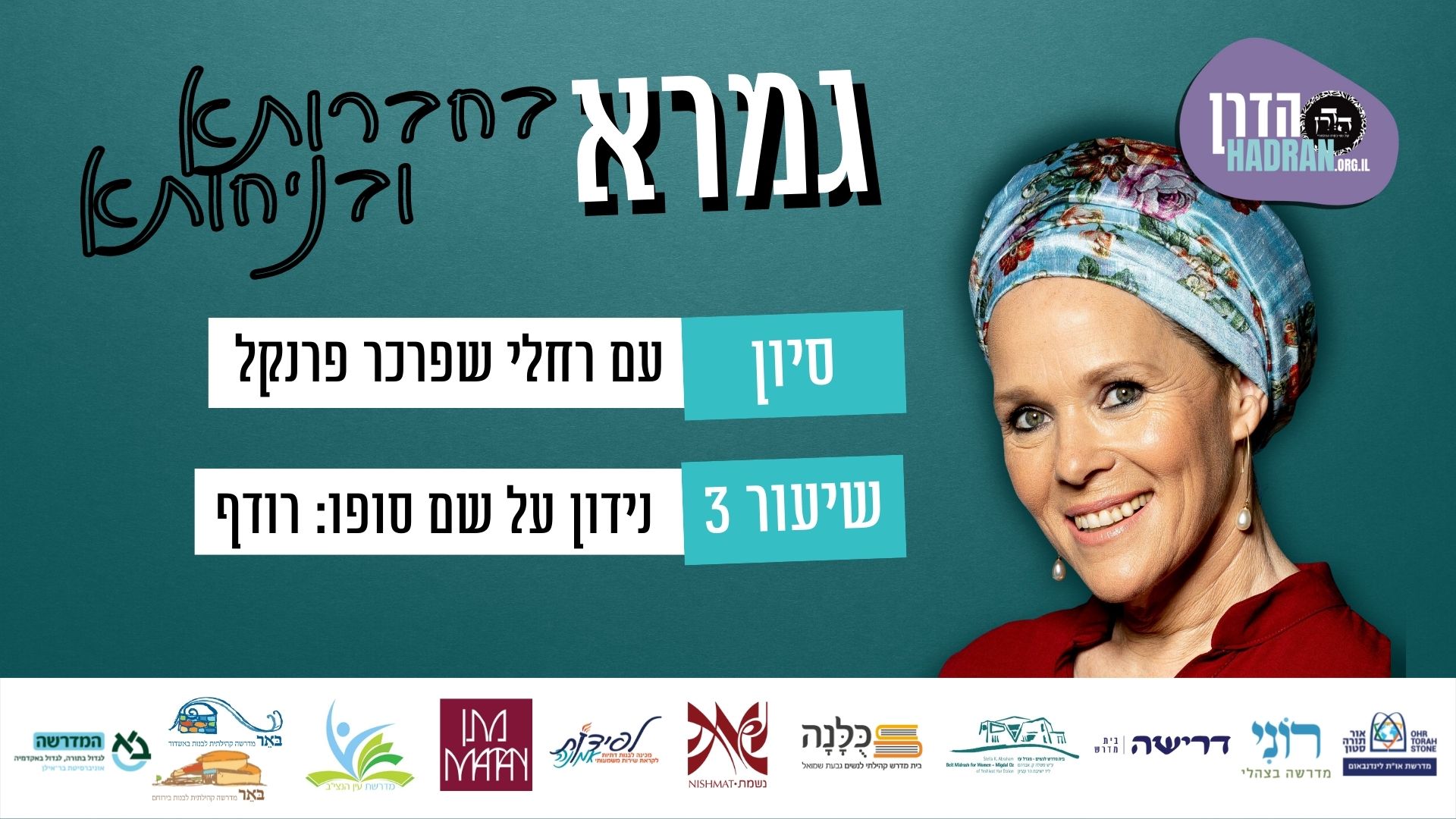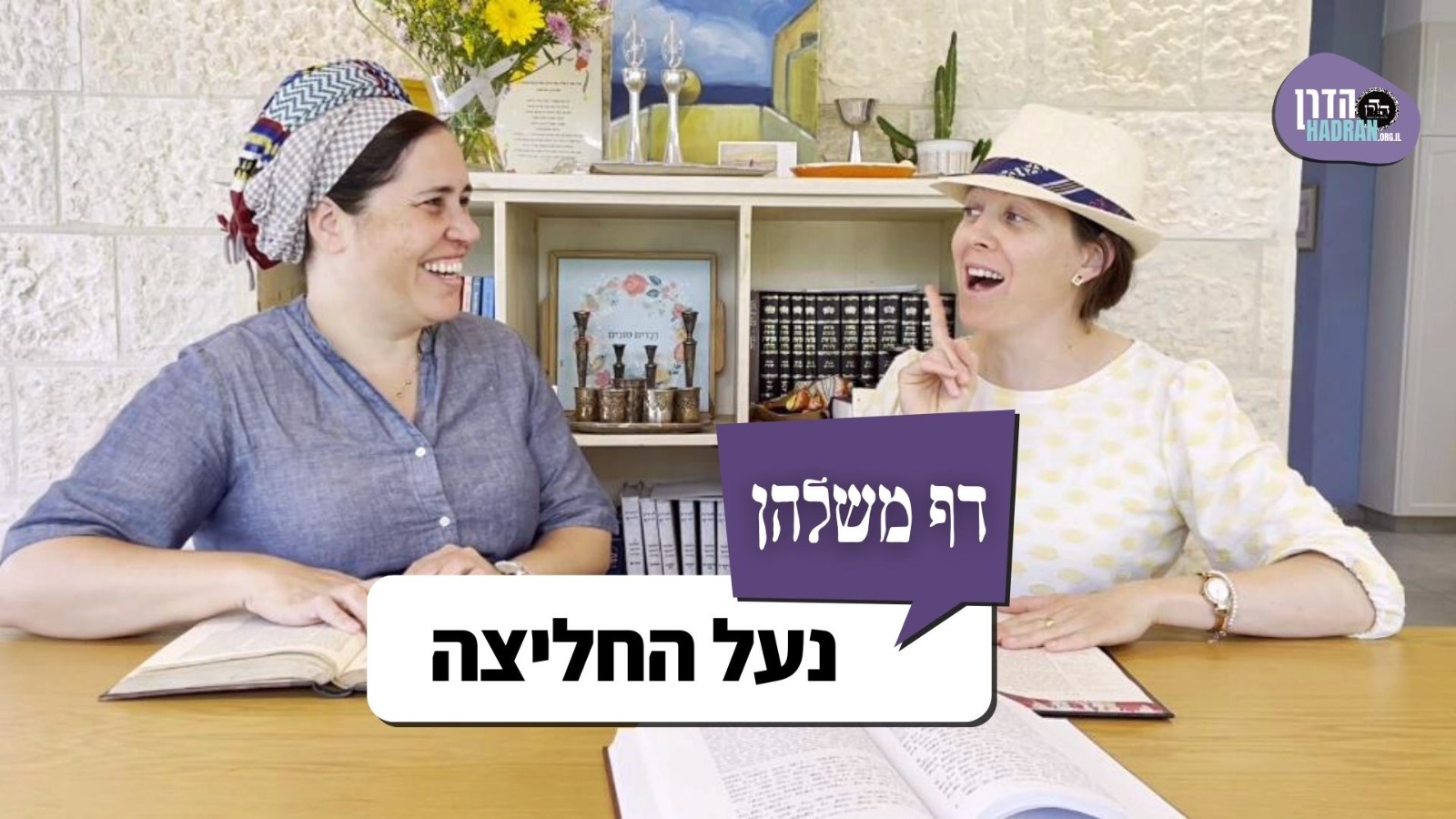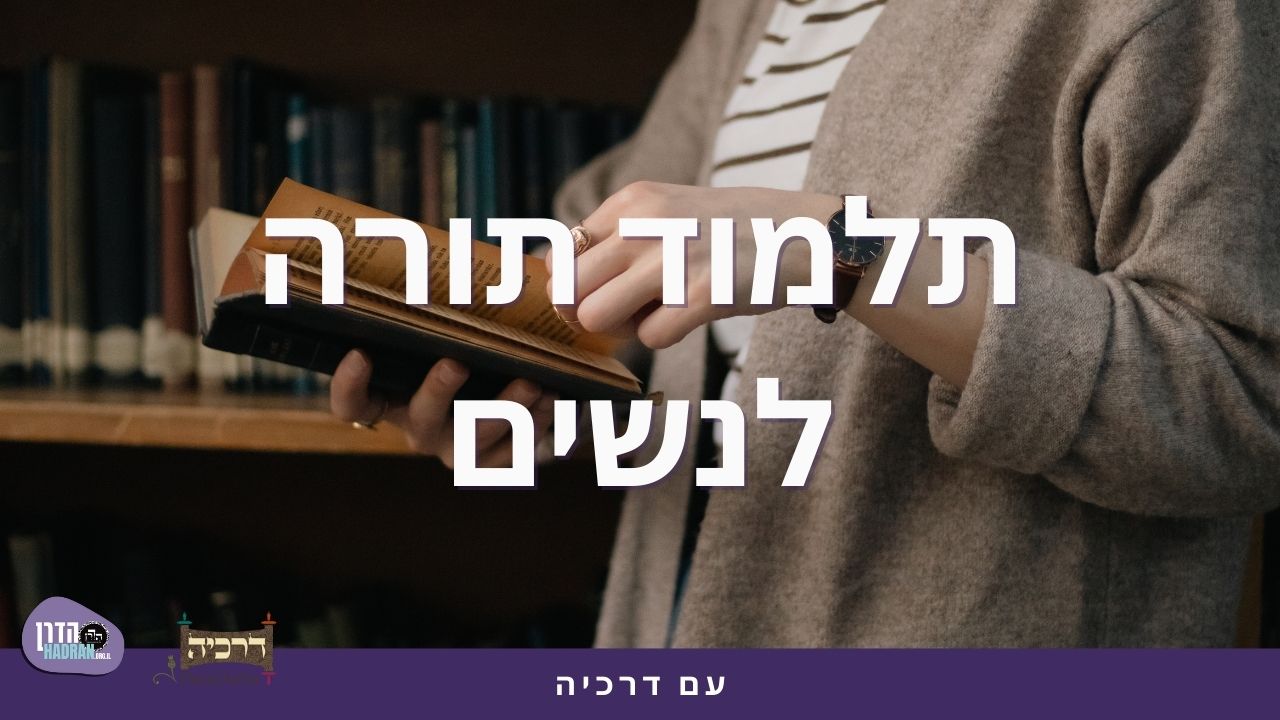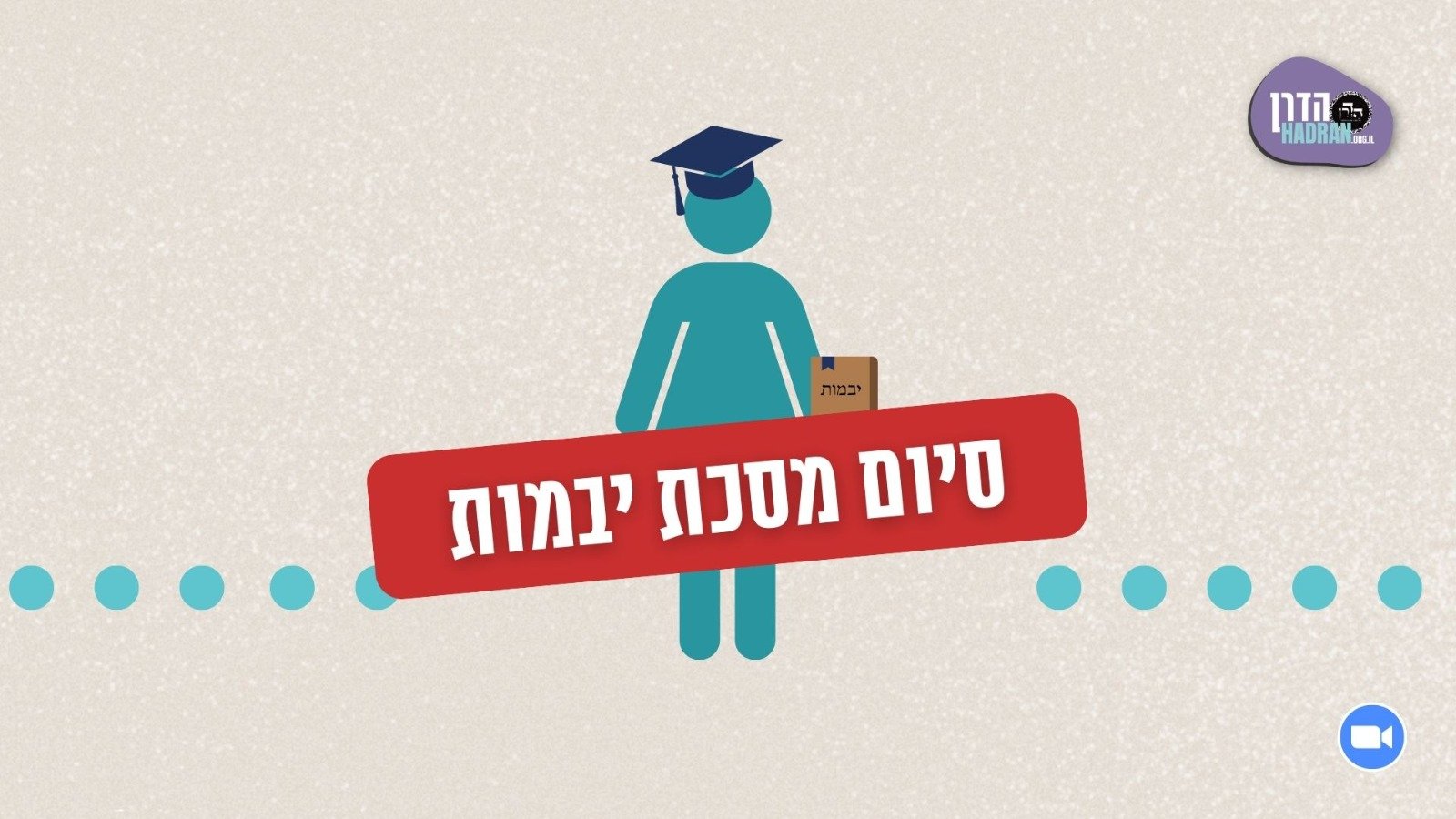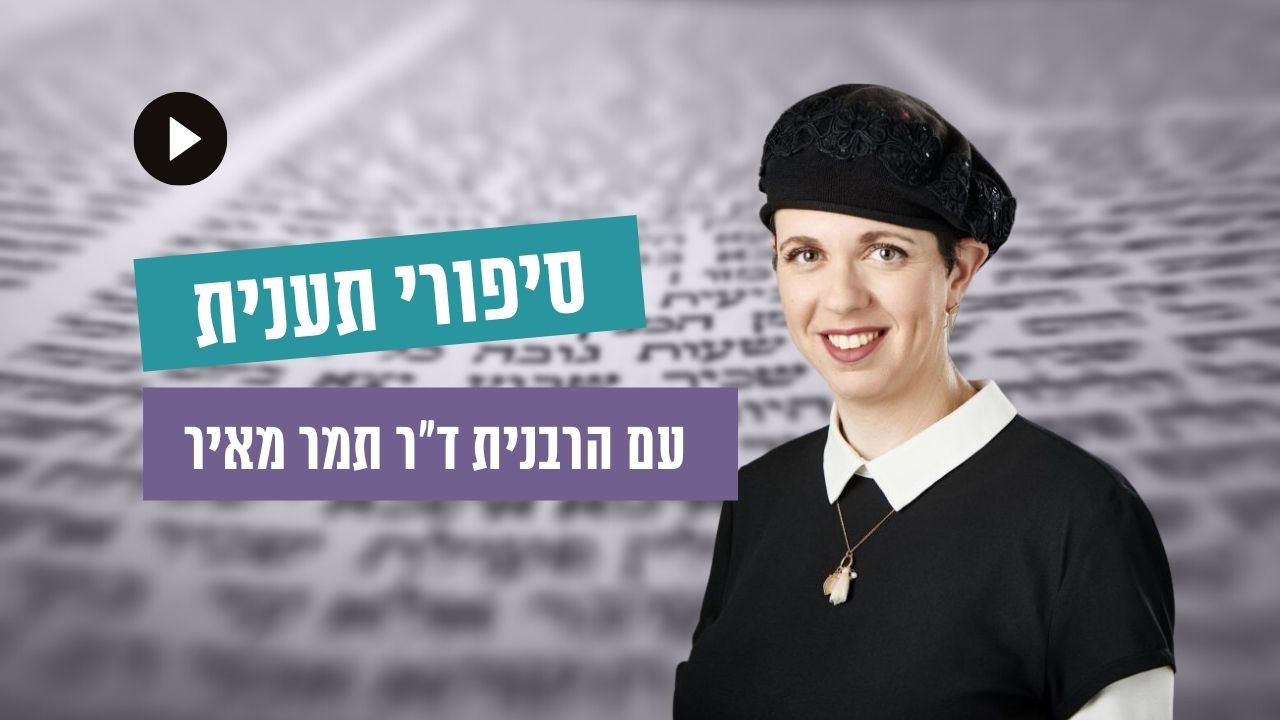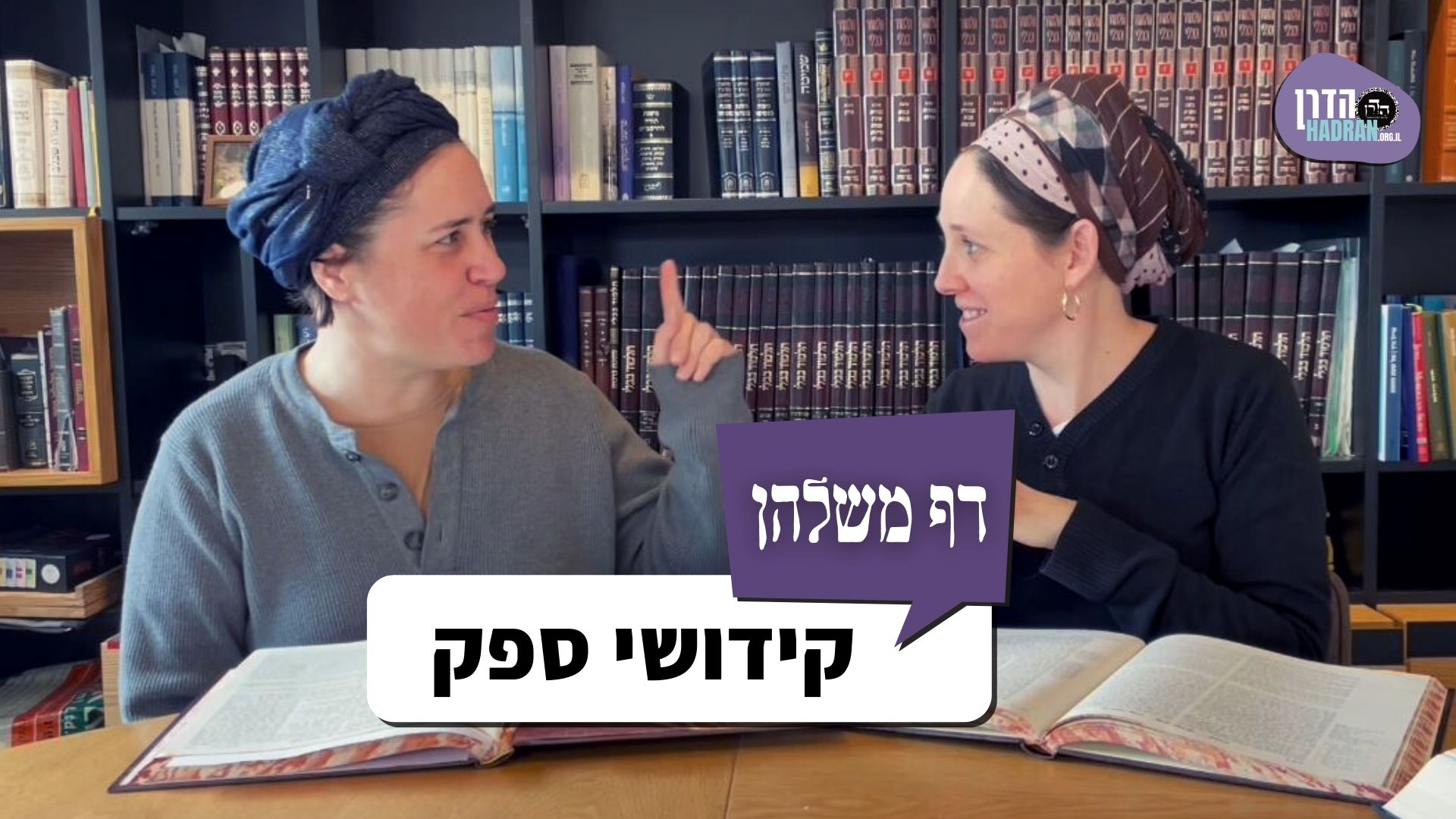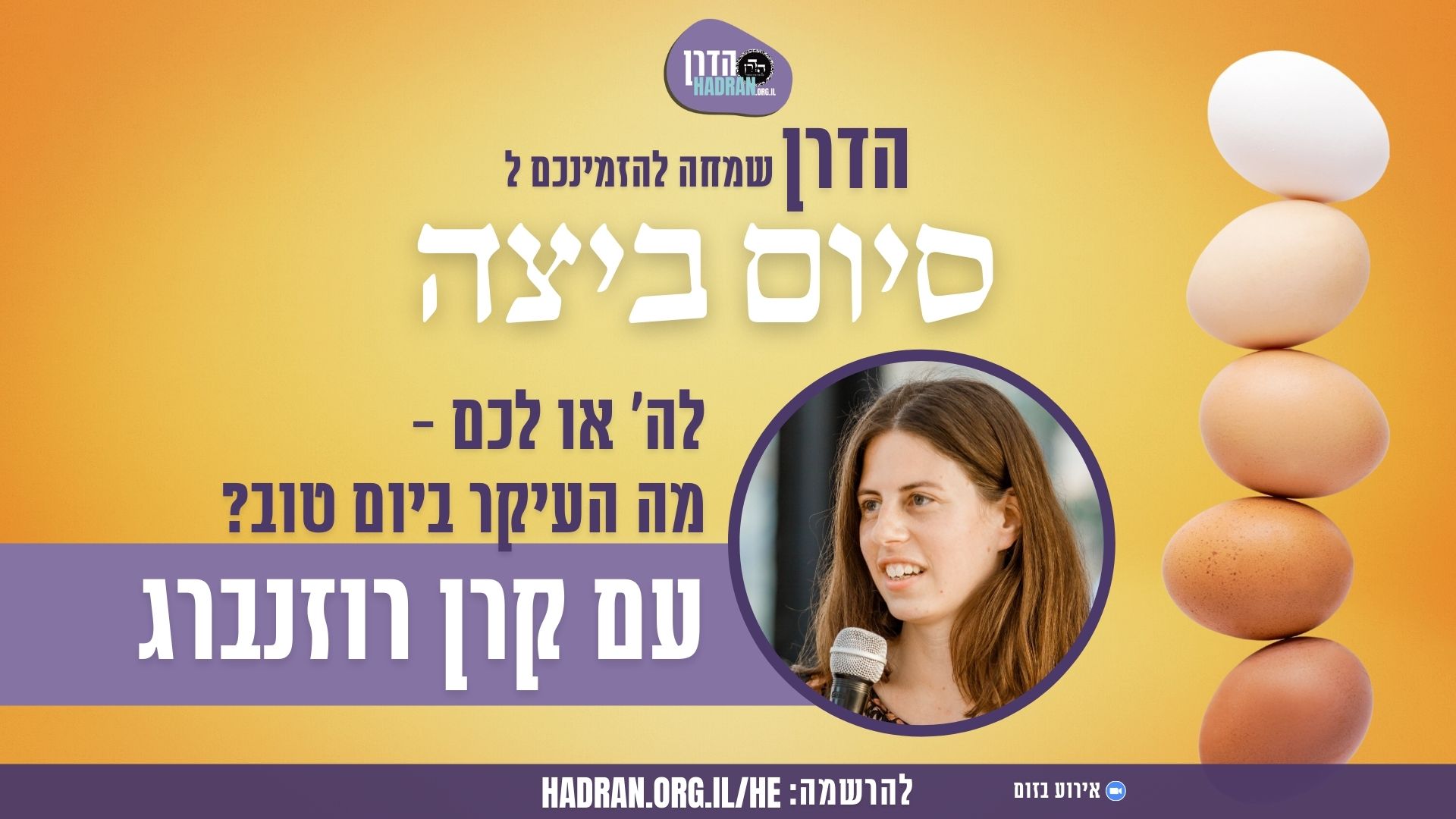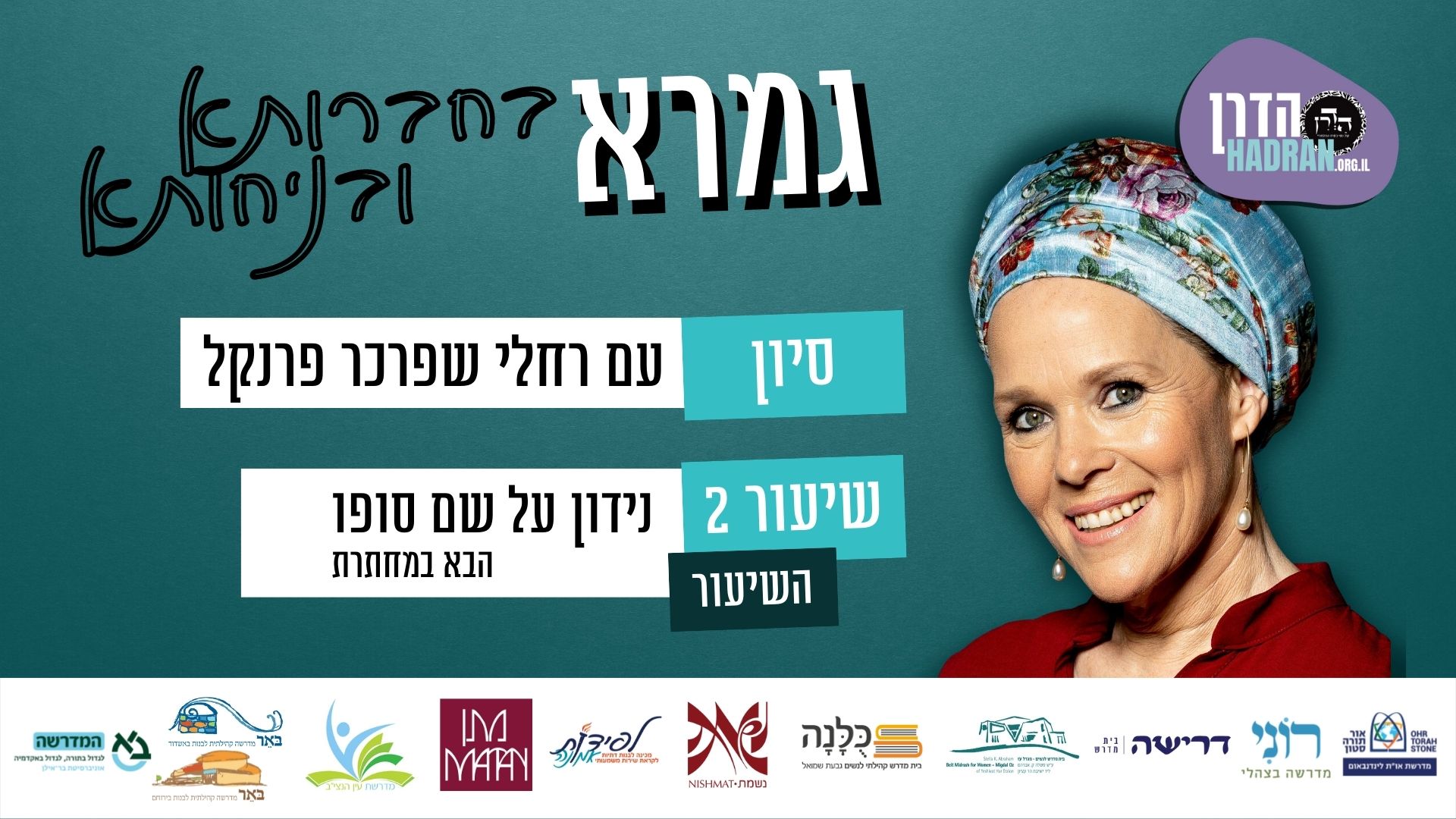יש ברייתא שמחזקת שיטת רבא שלומד מתוך קל וחומר שהרואה דם מטמאה משכבה ומושבה לטמא אדם ולטמא בגדים שעליו. יש שתי גירסאות שונות לדברי רב הונא – האם הוא צמצם את הדין של מעת לעת לקדשים בלבד או גם לתרומה? יש קושיות נגד הגירסה שהדין רק לקדשים והגמרא מתרצת כל קושי. על הגירסה השנייה מביאים ברייתא להקשות ומתרצים.

כלים
הלימוד החודש מוקדש לרפואת פיליס הכט, גיטל פעשא בת מאשה רחל על ידי חברותיה הרבות שאוהבות ומעריכות אותה.
כלים
העמקה
רוצה להבין מה באמת קורה מתחת לפני השטח של הסוגיה?
שיעורים, פודקאסטים והרחבות של מיטב המורות שלנו יפתחו לך עוד זוויות וכיווני חשיבה.
חדשה בלימוד הגמרא?
זה הדף הראשון שלך? איזו התרגשות עצומה! יש לנו בדיוק את התכנים והכלים שיעזרו לך לעשות את הצעדים הראשונים ללמידה בקצב וברמה שלך, כך תוכלי להרגיש בנוח גם בתוך הסוגיות המורכבות ומאתגרות.
פסיפס הלומדות שלנו
גלי את קהילת הלומדות שלנו, מגוון נשים, רקעים וסיפורים. כולן חלק מתנועה ומסע מרגש ועוצמתי.
נדה ו
כְּמַגַּע עַצְמָהּ, מָה מַגַּע עַצְמָהּ מְטַמֵּא אָדָם לְטַמֵּא בְּגָדִים, אַף מִשְׁכָּבָהּ וּמוֹשָׁבָהּ מְטַמֵּא אָדָם לְטַמֵּא בְּגָדִים.
are like her touch itself. Just as her touch transmits impurity to a person who comes in contact with them to the extent that he transmits impurity to the garments he is wearing, so too her bed and her chair transmit impurity to a person who comes in contact with them to the extent that he transmits impurity to the garments he is wearing.
תַּנְיָא כְּוָותֵיהּ דְּרָבָא: הָרוֹאָה דָּם — מְטַמְּאָה מֵעֵת לְעֵת, וּמָה הִיא מְטַמְּאָה? מִשְׁכָּבוֹת וּמוֹשָׁבוֹת, אֳוכָלִין וּמַשְׁקִין, וּכְלִי חֶרֶס הַמּוּקָּף צָמִיד פָּתִיל, וְאֵינָהּ מְקוּלְקֶלֶת לְמִנְיָנָהּ, וְאֵינָהּ מְטַמְּאָה אֶת בּוֹעֲלָהּ לְמַפְרֵעַ. רַבִּי עֲקִיבָא אוֹמֵר: מְטַמֵּא אֶת בּוֹעֲלָהּ, וְאֵינָהּ מוֹנָה אֶלָּא מִשָּׁעָה שֶׁרָאֲתָה.
§ It is taught in a baraita in accordance with the opinion of Rava: If a woman sees menstrual blood, it renders her impure retroactively for a twenty-four-hour period. And what does she render impure during that period? Beds and chairs, food and drink, and an earthenware vessel sealed with a tightly bound cover [tzamid patil], if she moves it. But she does not disrupt her count of the periods of menstruation and ziva, i.e., she starts her cycle only from that day when she saw the blood, and she does not render impure retroactively a man who engaged in intercourse with her. Rabbi Akiva says: She does render impure a man who engaged in intercourse with her. And she counts her seven days of impurity only from the time that she saw her menstrual blood, not retroactively.
הָרוֹאָה כֶּתֶם, מְטַמְּאָה לְמַפְרֵעַ, וּמָה הִיא מְטַמְּאָה? אֳוכָלִין וּמַשְׁקִין, מִשְׁכָּבוֹת וּמוֹשָׁבוֹת, וּכְלִי חֶרֶס הַמּוּקָּף צָמִיד פָּתִיל, וּמְקוּלְקֶלֶת לְמִנְיָנָהּ, וּמְטַמְּאָה אֶת בּוֹעֲלָהּ, וְאֵינָהּ מוֹנָה אֶלָּא מִשָּׁעָה שֶׁרָאֲתָה.
The baraita continues: With regard to a woman who sees a blood stain, it renders her impure retroactive to when the garment was last checked. And what does she render impure during that period? Food and drink, beds and chairs, and an earthenware vessel sealed with a tightly bound cover, if she moves it. And it also disrupts her count of eleven days during which emission of blood renders the woman a zava, as the time of the stain is unknown, and she renders ritually impure a man who engaged in intercourse with her. And she counts her seven days of impurity only from the time that she saw her menstrual blood, not retroactively.
וְזֶה וָזֶה תּוֹלִין, לֹא אוֹכְלִין וְלֹא שׂוֹרְפִין.
The baraita further teaches: With regard to both this, one who sees menstrual blood, and that, one who sees a blood stain, if they had touched teruma, its status is suspended. It is not eaten, as impure teruma is prohibited in consumption, but it is not burned either, since it is prohibited to burn pure teruma.
וְרָבָא, אִי שְׁמִיעַ לֵיהּ מַתְנִיתָא — לֵימָא מַתְנִיתָא, וְאִי לָא שְׁמִיעַ לֵיהּ מַתְנִיתָא — קַל וָחוֹמֶר מְנָא לֵיהּ?
The Gemara raises a difficulty: And as for Rava, why is the halakha of an earthenware vessel more obvious to him than the halakha of a bed and a chair? If he had heard this baraita, which states the halakha of an earthenware vessel, then let him say that the baraita itself is proof for his opinion with regard to a bed and a chair as well, as the baraita states both halakhot. And if he had not heard this baraita, from where did he learn his a fortiori inference, which is based on the halakha that an earthenware vessel sealed with a tightly bound cover is not spared from impurity if a menstruating woman moved it during her twenty-four-hour period of retroactive impurity?
לְעוֹלָם שְׁמִיעַ לֵיהּ מַתְנִיתָא, וְאִי מִמַּתְנִיתָא הֲוָה אָמֵינָא: אוֹ אָדָם אוֹ בְּגָדִים, אֲבָל אָדָם וּבְגָדִים — לָא, מִשּׁוּם הָכִי קָאָמַר קַל וָחוֹמֶר.
The Gemara answers: Actually, he did hear the baraita. But if his proof had been merely from the baraita, I would say that a different halakha applies to a bed and chair than to the earthenware vessels, as the baraita means that the bed and chair render impure a person or garments that they touch, but they do not render a person impure to the extent that he then transmits impurity to his garments. It is due to that reason that Rava says the a fortiori inference.
אָמַר רַב הוּנָא: מֵעֵת לְעֵת שֶׁבְּנִדָּה לַקֹּדֶשׁ, אֲבָל לֹא לַתְּרוּמָה. אִי הָכִי, לִיתְנֵי גַּבֵּי מַעֲלוֹת! כִּי קָתָנֵי הֵיכָא דְּאִית לֵיהּ דְּרָרָא דְּטוּמְאָה, אֲבָל הֵיכָא דְּלֵית לֵיהּ דְּרָרָא דְּטוּמְאָה — לָא קָתָנֵי.
§ Rav Huna says: The twenty-four-hour period of retroactive impurity of a menstruating woman applies only to sacrificial food but not to teruma. The Gemara asks: If so, let the mishna in Ḥagiga 20b teach this among the other higher levels of purity that apply to sacrificial foods but not to teruma. That mishna lists stringencies of ritual purity that are in effect with regard to sacrificial foods and not teruma. The Gemara answers: When that mishna teaches those higher levels of purity, it is referring only to types of impurity that have a connection [derara] to impurity as defined by Torah law. But it does not teach a case where there is no connection to impurity as defined by Torah law, and the retroactive impurity of a menstruating woman is by rabbinic law.
מֵיתִיבִי: מָה הִיא מְטַמְּאָה? אֳוכָלִין וּמַשְׁקִין. מַאי לָאו, בֵּין דְּקֹדֶשׁ בֵּין דִּתְרוּמָה? לָא, דְּקֹדֶשׁ.
The Gemara raises an objection from the aforementioned baraita that deals with the retroactive impurity of a menstruating woman: What does she render impure during that period? Food and drink. The Gemara asks: What, is it not correct to say that this is referring both to sacrificial food and to teruma? The Gemara answers: No, it is referring only to sacrificial food, not to teruma.
תָּא שְׁמַע: רַבִּי יְהוּדָה אוֹמֵר, אַף בִּשְׁעַת עֲבָרָתָן מִלֶּאֱכוֹל בִּתְרוּמָה. וְהָוֵינַן בַּהּ: מַאי דַהֲוָה הֲוָה!
The Gemara suggests: Come and hear a proof from a mishna (11a): With regard to women of priestly families who must examine themselves before partaking of teruma, Rabbi Yehuda says: Even when they conclude partaking of teruma, they still need to examine themselves. And we discussed this statement of Rabbi Yehuda and asked: Why do they need to examine themselves after they finish eating teruma? What was, was; i.e., if a woman was impure when she ate the teruma, what is achieved by an examination now?
אָמַר רַב חִסְדָּא: לֹא נִצְרְכָה אֶלָּא לְתַקֵּן שִׁירַיִם שֶׁבְּפָנֶיהָ.
And Rav Ḥisda says in explanation: It was necessary only in order to amend the situation of the remaining teruma that is left before her, i.e., to prevent it from being rendered ritually impure. In other words, if she later experiences a flow of menstrual blood, her retroactive impurity status will not render the remaining teruma impure. This ruling apparently contradicts the opinion of Rav Huna, who said that the retroactive impurity of a menstruating woman affects only sacrificial foods, not teruma.
רַב הוּנָא מַתְנֵי לִישְׂרוֹף שִׁירַיִם שֶׁבְּיָדֶיהָ, שֶׁבָּדְקָה עַצְמָהּ כְּשִׁיעוּר וֶסֶת.
The Gemara answers: According to Rav Huna, Rabbi Yehuda teaches that since impure teruma must be burned, she must examine herself in order to determine whether it is correct to burn the remaining teruma that was in her hands. If she examined herself immediately after eating the teruma, in the period of time needed for the onset of menstruation (see 14b), and she found that she was impure, it is assumed as a certainty that she was impure when she ate the teruma. Consequently, the remaining teruma must be burned, in accordance with the halakha of teruma that was definitely rendered impure. But in fact, Rav Huna maintains that she does not render that remaining teruma impure retroactively, in a case where she did not examine herself.
תָּא שְׁמַע: מַעֲשֶׂה, וְעָשָׂה רַבִּי כְּרַבִּי אֱלִיעֶזֶר.
The Gemara further suggests: Come and hear another difficulty with regard to the opinion of Rav Huna from a baraita: There was an incident in which Rabbi Yehuda HaNasi performed an action by ruling that the halakha is in accordance with the opinion of Rabbi Eliezer. Rabbi Eliezer maintains that a woman who passed three expected menstrual cycles without experiencing bleeding is presumed not to be menstruating any longer, and therefore any menstrual blood that she emits later renders her ritually impure only from then onward, but not retroactively. By contrast, the Rabbis contend that this halakha applies only to an older woman, for whom it is natural to stop menstruating, but not to a young woman, even if three typical periods have passed without bleeding.
לְאַחַר שֶׁנִּזְכַּר, אָמַר: כְּדַי הוּא רַבִּי אֱלִיעֶזֶר לִסְמוֹךְ עָלָיו
The baraita continues: After Rabbi Yehuda HaNasi remembered that Rabbi Eliezer’s colleagues disagree with Rabbi Eliezer on this matter and that he had apparently ruled incorrectly, he nevertheless said: Rabbi Eliezer is worthy [kedai] to rely upon
בִּשְׁעַת הַדְּחָק. וְהָוֵינַן בַּהּ: מַאי ״לְאַחַר שֶׁנִּזְכַּר״? אִילֵּימָא לְאַחַר שֶׁנִּזְכַּר דְּאֵין הֲלָכָה כְּרַבִּי אֱלִיעֶזֶר אֶלָּא כְּרַבָּנַן, בִּשְׁעַת הַדְּחָק הֵיכִי עָבֵיד כְּוָתֵיהּ?
in exigent circumstances [bishe’at hadeḥak]. And we discussed it and asked: What is the meaning of: After he remembered? If we say that this means after he remembered that the halakha is not in accordance with the opinion of Rabbi Eliezer but in accordance with the opinion of the Rabbis, if so, how could Rabbi Yehuda HaNasi act in accordance with Rabbi Eliezer even in exigent circumstances, since the halakha has been decided against him?
אֶלָּא (לָאו) דְּלָא אִיתְּמַר הִלְכְתָא, לָא כְּמָר וְלָא כְּמָר, וְכֵיוָן שֶׁנִּזְכַּר דְּלָאו יָחִיד פְּלִיג עֲלֵיהּ, אֶלָּא רַבִּים פְּלִיגִי עֲלֵיהּ, אָמַר: ״כְּדַי הוּא רַבִּי אֱלִיעֶזֶר לִסְמוֹךְ עָלָיו בִּשְׁעַת הַדְּחָק״.
Rather, is it not correct that the halakha had not been stated on this matter, neither in accordance with the opinion of this Sage, Rabbi Eliezer, nor in accordance with the opinion of that Sage, i.e., the Rabbis. And once Rabbi Yehuda HaNasi remembered that it was not a single authority who disagrees with Rabbi Eliezer, but it was several Sages who disagreed with him, and there is a principle that the halakha follows the opinion of the many over that of an individual, he nevertheless said: Rabbi Eliezer is worthy to rely upon in exigent circumstances.
אִי אָמְרַתְּ בִּשְׁלָמָא לִתְרוּמָה, הַיְינוּ דַּהֲוַאי תְּרוּמָה בִּימֵי רַבִּי, אֶלָּא אִי אָמְרַתְּ לְקֹדֶשׁ — קֹדֶשׁ בִּימֵי רַבִּי מִי הֲוַאי?
The Gemara explains the proof from the baraita: Granted, if you say that it was a case of a menstruating woman who had touched teruma during the previous twenty-four hours, this is fine, as teruma still existed in the days of Rabbi Yehuda HaNasi. But if you say that it was a case of a woman who touched sacrificial food, was there still sacrificial food in days of Rabbi Yehuda HaNasi, after the destruction of the Temple? Clearly, the case involved teruma, and according to the Rabbis, whose opinion is accepted as halakha, this woman who had skipped three menstrual cycles nevertheless renders teruma impure retroactively. This ruling apparently contradicts the opinion of Rav Huna.
כִּדְעוּלָּא, דְּאָמַר עוּלָּא: חַבְרַיָּא מְדַכַּן בְּגָלִילָא. הָכָא נָמֵי בִּימֵי רַבִּי.
The Gemara answers: This can be answered in accordance with the testimony of Ulla, as Ulla said: Ḥaverim purify their wine and oil in the Galilee, i.e., they produce their wine and oil by the standards of purity used for sacrificial food, in the hope that the Temple will be rebuilt in their lifetime. Here, too, in the days of Rabbi Yehuda HaNasi there were those who kept the standards of purity observed for sacrificial food.
תָּא שְׁמַע: מַעֲשֶׂה בְּשִׁפְחָתוֹ שֶׁל רַבָּן גַּמְלִיאֵל שֶׁהָיְתָה אוֹפָה כִּכָּרוֹת שֶׁל תְּרוּמָה, וּבֵין כׇּל אַחַת וְאַחַת מְדִיחָה יָדָהּ בְּמַיִם וּבוֹדֶקֶת, בָּאַחֲרוֹנָה בָּדְקָה וּמָצְאָה טְמֵאָה, וּבָאת וְשָׁאֲלָה אֶת רַבָּן גַּמְלִיאֵל, וְאָמַר לָהּ: כּוּלָּן טְמֵאוֹת. אָמְרָה לוֹ: רַבִּי, וַהֲלֹא בְּדִיקָה הָיְתָה לִי בֵּין כׇּל אַחַת וְאַחַת! אָמַר לָהּ: אִם כֵּן, הִיא טְמֵאָה וְכוּלָּן טְהוֹרוֹת.
The Gemara suggests: Come and hear a baraita: There was an incident involving the maidservant of Rabban Gamliel, who was baking loaves of teruma bread. And in between each and every one she would wash her hand in water and examine herself. After the last one she examined herself and found that she was impure due to menstrual blood, and she came and asked Rabban Gamliel about the status of the loaves. And he said to her: They are all impure, due to her retroactive impurity for the previous twenty-four hours. She said to him: My teacher, didn’t I perform an examination in between each and every one? Rabban Gamliel said to her: If so, then this last one is impure and the rest are all pure, as your retroactive impurity is reduced until the time of the most recent examination.
קָתָנֵי מִיהַת: כִּכָּרוֹת שֶׁל תְּרוּמָה. מַאי תְּרוּמָה? תְּרוּמַת לַחְמֵי תוֹדָה. תְּרוּמַת לַחְמֵי תוֹדָה בַּאֲפִיָּה מַאי בָּעֲיָא?
The Gemara explains the difficulty: In any event, the baraita teaches that the case involved loaves of teruma bread. This apparently contradicts the opinion of Rav Huna, as Rabban Gamliel applied retroactive impurity in a case of teruma. The Gemara answers: What is meant by: Teruma? It means teruma of the loaves of the thanks offering, i.e., the four loaves of the thanks offering that were separated from the total of forty and eaten by the priests. These are sacrificial foods, not teruma. The Gemara raises a difficulty with regard to this interpretation: What was she doing baking the teruma of the loaves of the thanks offering alone? All forty loaves of the thanks offering are baked together, and only afterward are four set aside as teruma to be eaten by priests.
דְּאַפְרְשִׁינְהוּ בְּלֵישַׁיְיהוּ, וְכִי הָא דְּאָמַר רַב טוֹבִי בַּר רַב קַטִּינָא: לַחְמֵי תוֹדָה שֶׁאֲפָאָן אַרְבַּע חַלּוֹת — יָצָא, וְהָוֵינַן בַּהּ: וְהָא בָּעֵינַן אַרְבָּעִים! לְמִצְוָה.
The Gemara answers: This is referring to a case where dough for the teruma loaves was separated and designated for the priests during its kneading. And this halakha is in accordance with that which Rav Tovi bar Rav Ketina said: If one baked the loaves of the thanks offering as four loaves, rather than the requisite forty loaves, he has fulfilled his obligation. And we discussed it and asked: Isn’t one required to bring forty loaves with the thanks offering, ten loaves of each of the four different types? The Gemara answers: One must bake forty loaves in order to fulfill the mitzva in the optimal fashion, but he has nevertheless fulfilled his obligation with four loaves, one of each type.
וְהָא בָּעֵינַן אַפְרוֹשֵׁי תְּרוּמָה מִינַּיְיהוּ! וְכִי תֵּימָא דְּמַפְרֵישׁ פְּרוּסָה מִכׇּל חַד וְחַד, ״אֶחָד״ אֲמַר רַחֲמָנָא, שֶׁלֹּא יִטּוֹל פְּרוּסָה, וְאָמְרִינַן דְּאַפְרְשִׁינְהוּ בְּלֵישַׁיְיהוּ, הָכָא נָמֵי דְּאַפְרְשִׁינְהוּ בְּלֵישַׁיְיהוּ.
The Gemara continues its answer by further elucidating the statement of Rav Tovi bar Rav Ketina. And we asked with regard to this opinion: But he is required to separate teruma from it, i.e., to designate one loaf from each type that is given to the priests. And if you would say that he separates a slice from each one of the four loaves and gives them to the priest, this cannot be the case, as the Merciful One states in the Torah: “And of it he shall present one out of each offering for a gift to the Lord; it shall be the priest’s” (Leviticus 7:14). The word “one” indicates that he may not take a slice, but rather he takes a complete loaf. The Gemara answers: Rather, we must say that he separated dough for the teruma loaves during its kneading. Here too, in the incident involving Rabban Gamliel’s maidservant, she separated the dough during its kneading.
תָּא שְׁמַע: שׁוּב מַעֲשֶׂה בְּשִׁפְחָה שֶׁל רַבָּן גַּמְלִיאֵל, שֶׁהָיְתָה גָּפָה חָבִיּוֹת שֶׁל יַיִן, וּבֵין כׇּל אַחַת וְאַחַת מְדִיחָה יָדֶיהָ בְּמַיִם וּבוֹדֶקֶת, וּבָאַחֲרוֹנָה בָּדְקָה וּמָצְאָה טְמֵאָה, וּבָאת וְשָׁאֲלָה לְרַבָּן גַּמְלִיאֵל, וְאָמַר לָהּ: כּוּלָּן טְמֵאוֹת. אָמְרָה לוֹ: וַהֲלֹא בְּדִיקָה הָיְתָה לִי בֵּין כׇּל אַחַת וְאַחַת! אֲמַר לַהּ: אִם כֵּן, הִיא טְמֵאָה וְכוּלָּן טְהוֹרוֹת.
The Gemara suggests: Come and hear a proof from a baraita: There was another incident involving the maidservant of Rabban Gamliel who was sealing barrels of wine. And in between each and every one she would wash her hands in water and examine herself. And after the last one she examined herself and found that she was ritually impure, and she came and asked Rabban Gamliel about the wine. And he said to her: They are all impure. She said to him: My teacher, didn’t I perform an examination in between each and every one? Rabban Gamliel said to her: If so, this last one is impure and the rest are all pure.
אִי אָמְרַתְּ בִּשְׁלָמָא חֲדָא דְּקֹדֶשׁ, וַחֲדָא דִּתְרוּמָה הִיא, הַיְינוּ דְּהָדְרָה וְשָׁיְילָה. אֶלָּא אִי אָמְרַתְּ אִידֵּי וְאִידֵּי דְּקֹדֶשׁ, לְמָה לַהּ לְמֶהְדַּר וּלְשַׁיּוֹלֵיהּ? מַעֲשֶׂה שֶׁהָיָה — בִּשְׁתֵּי שְׁפָחוֹת הָיָה.
The Gemara clarifies the difficulty with regard to Rav Huna’s opinion: Granted, if you say that one incident involved a case of sacrificial food and one incident involved a case of teruma, this is the reason that she returned and again asked Rabban Gamliel what to do. But if you say that both this incident and that incident involved sacrificial food, why did she need to return and ask him the same question a second time? The Gemara answers: Each incident that occurred was with sacrificial food and they happened with two different maidservants.
לִישָּׁנָא אַחֲרִינָא אָמְרִי לַהּ, אָמַר רַב הוּנָא: מֵעֵת לְעֵת שֶׁבְּנִדָּה מְטַמְּאָה בֵּין לַקֹּדֶשׁ וּבֵין לַתְּרוּמָה. מִמַּאי? מִדְּלָא קָתָנֵי לַהּ גַּבֵּי מַעֲלוֹת. אֲמַר לֵיהּ רַב נַחְמָן: וְהָא תָּנֵי תַּנָּא לַקֹּדֶשׁ אֲבָל לֹא לַתְּרוּמָה!
Some say another version of Rav Huna’s statement. Rav Huna says: During the twenty-four-hour period of retroactive impurity of a menstruating woman, she renders impure both sacrificial food and teruma. The Gemara asks: From where is this derived? The Gemara answers: It can be inferred from the fact that the mishna in Ḥagiga (20b) does not teach this matter among the other matters where higher levels of purity are required only for sacrificial foods but not for teruma. Rav Naḥman said to Rav Huna: But doesn’t the tanna explicitly teach in a baraita: The retroactive impurity of a menstruating woman applies only with regard to sacrificial food but not with regard to teruma?
קַבְּלַהּ מִינֵּיהּ רַב שְׁמוּאֵל בַּר רַב יִצְחָק: בְּחוּלִּין שֶׁנַּעֲשׂוּ עַל טׇהֳרַת קֹדֶשׁ, וְלֹא בְּחוּלִּין שֶׁנַּעֲשׂוּ עַל טׇהֳרַת תְּרוּמָה.
The Gemara answers: Rav Shmuel bar Rav Yitzḥak received the following explanation from Rav Naḥman: The baraita means that this retroactive impurity applies to non-sacred food that was prepared according to the standards of purity of sacrificial food, but not to non-sacred food that was prepared according to the standards of purity of teruma. It does apply to teruma itself.
תְּנַן הָתָם: נוֹלַד לָהּ סְפֵק טוּמְאָה, עַד שֶׁלֹּא גִּלְגְּלָה — תֵּעָשֶׂה בְּטוּמְאָה, מִשֶּׁגִּלְגְּלָה — תֵּעָשֶׂה בְּטׇהֳרָה.
§ With regard to a non-sacred food prepared according to the standards of purity of teruma, we learned in a mishna elsewhere (Ḥalla 3:2): In a case of dough where uncertainty developed as to whether it was ritually impure, if the uncertainty developed before it was kneaded, it may be prepared even in definite impurity, i.e., with impure vessels. If it developed after it was kneaded, it must be prepared in purity.
עַד שֶׁלֹּא גִּלְגְּלָהּ — תֵּעָשֶׂה בְּטוּמְאָה, חוּלִּין נִינְהוּ, וּמוּתָּר לִגְרוֹם טוּמְאָה לְחוּלִּין שֶׁבְּאֶרֶץ יִשְׂרָאֵל; מִשֶּׁגִּלְגְּלָה — תֵּעָשֶׂה בְּטׇהֳרָה, חוּלִּין הַטְּבוּלִין לְחַלָּה כְּחָלָה דָּמוּ, וְאָסוּר לִגְרוֹם טוּמְאָה לְחַלָּה.
The baraita elaborates: Before it was kneaded it may be prepared even in definite impurity because it is non-sacred food, and the halakha is that it is permitted to cause impurity to non-sacred food in Eretz Yisrael. After it was kneaded it must be prepared in purity, since non-sacred food that is untithed with regard to the obligation to separate ḥalla, i.e., its ḥalla has not yet been separated, is considered like ḥalla, and it is prohibited to cause impurity to ḥalla.
תָּנָא:
It is taught in a baraita:

